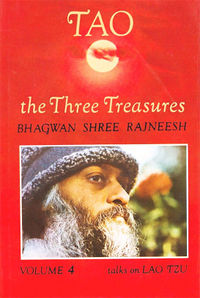Tao: The Three Treasures, Vol 4: Difference between revisions
Jump to navigation
Jump to search
(New format / Production info) |
|||
| Line 1: | Line 1: | ||
{{book| | |||
description =Lao Tzu speaks of his "three treasures": Love... Never too much... Never be the first in the world. Osho uses this exquisite text to deliver some of his most potent words on love - not as an emotion but as the subtlest form of energy, the substratum of all energy and the essence of life itself. He also speaks on love in relation to sex, fear, the family, science, art and prayer; the mind as a biocomputer; the difficulty of comprehending the simple; and the problem of identification with the body. A treasure trove of Osho's wisdom. | | |||
translated = | | |||
notes =Originally the "Three Treasures" series was published as two volumes, later republished as four volumes. | | |||
period = Aug 23, 1975 to Aug 31, 1975 |year=1975| | |||
nofd = 9 | | |||
editions = | |||
{{bookedition|273_lrg.jpg|Talks on Fragments from Lao Tzu's Tao Te Ching|1977 | |||
:: Reprint : 1981|Rajneesh Foundation, Poona, India |1|0-88050-153-7 *|404|H|First edition April 1977, 5,000 copies. | |||
:: * Not all books have ISBN. | |||
::Published by [[Ma Yoga Laxmi]] | |||
::Compilation and editing: [[Sw Ananda Somendra]] | |||
::Design: [[Sw Anand Deekshant]] | |||
::Introduction: [[Sw Dharma Teerth Bodhisatwa]] | |||
}} | |||
| | |||
language = English| | |||
}} | |||
[[category:Tao]] | |||
[[category:First Edition Series]] | |||
= | |||
[[ | |||
:Edition | |||
Revision as of 07:42, 13 November 2013
- Lao Tzu speaks of his "three treasures": Love... Never too much... Never be the first in the world. Osho uses this exquisite text to deliver some of his most potent words on love - not as an emotion but as the subtlest form of energy, the substratum of all energy and the essence of life itself. He also speaks on love in relation to sex, fear, the family, science, art and prayer; the mind as a biocomputer; the difficulty of comprehending the simple; and the problem of identification with the body. A treasure trove of Osho's wisdom.
- notes
- Originally the "Three Treasures" series was published as two volumes, later republished as four volumes.
- time period of Osho's original talks/writings
- Aug 23, 1975 to Aug 31, 1975 : timeline
- number of discourses/chapters
- 9
editions
Tao: The Three Treasures, Vol 4Talks on Fragments from Lao Tzu's Tao Te Ching
|

